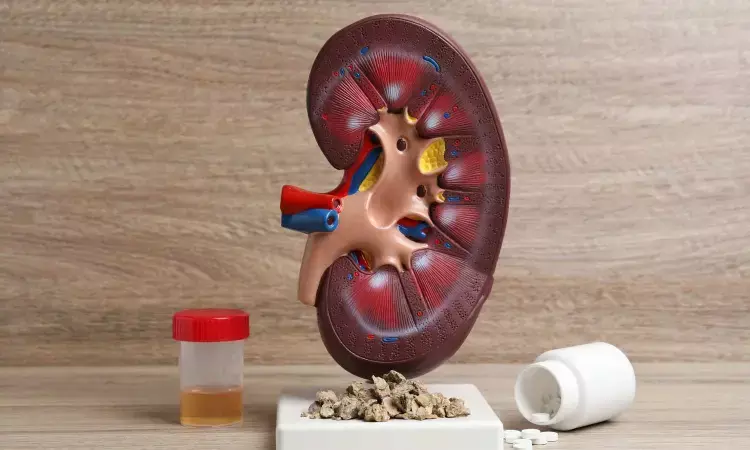- Home
- Medical news & Guidelines
- Anesthesiology
- Cardiology and CTVS
- Critical Care
- Dentistry
- Dermatology
- Diabetes and Endocrinology
- ENT
- Gastroenterology
- Medicine
- Nephrology
- Neurology
- Obstretics-Gynaecology
- Oncology
- Ophthalmology
- Orthopaedics
- Pediatrics-Neonatology
- Psychiatry
- Pulmonology
- Radiology
- Surgery
- Urology
- Laboratory Medicine
- Diet
- Nursing
- Paramedical
- Physiotherapy
- Health news
- Fact Check
- Bone Health Fact Check
- Brain Health Fact Check
- Cancer Related Fact Check
- Child Care Fact Check
- Dental and oral health fact check
- Diabetes and metabolic health fact check
- Diet and Nutrition Fact Check
- Eye and ENT Care Fact Check
- Fitness fact check
- Gut health fact check
- Heart health fact check
- Kidney health fact check
- Medical education fact check
- Men's health fact check
- Respiratory fact check
- Skin and hair care fact check
- Vaccine and Immunization fact check
- Women's health fact check
- AYUSH
- State News
- Andaman and Nicobar Islands
- Andhra Pradesh
- Arunachal Pradesh
- Assam
- Bihar
- Chandigarh
- Chattisgarh
- Dadra and Nagar Haveli
- Daman and Diu
- Delhi
- Goa
- Gujarat
- Haryana
- Himachal Pradesh
- Jammu & Kashmir
- Jharkhand
- Karnataka
- Kerala
- Ladakh
- Lakshadweep
- Madhya Pradesh
- Maharashtra
- Manipur
- Meghalaya
- Mizoram
- Nagaland
- Odisha
- Puducherry
- Punjab
- Rajasthan
- Sikkim
- Tamil Nadu
- Telangana
- Tripura
- Uttar Pradesh
- Uttrakhand
- West Bengal
- Medical Education
- Industry
CBD oil fails to reduce pain after common treatment for urinary stones

Researchers have found in First randomized trial of CBD for pain control after urinary stone treatment that treatment with cannabidiol (CBD) oil product fails to lower pain scores after surgical treatment and stent placement for patients with urinary stones.
The findings of the clinical trial have been published in the April issue of The Journal of Urology, an Official Journal of the American Urological Association (AUA).
"Urologists and patients alike are interested in finding effective alternatives to pain management after urinary stone treatment," comments senior author Karen Stern, MD, of Mayo Clinic Phoenix, Ariz. "Our study found that although treatment with CBD oil was safe, it wasn't effective in minimizing pain or opioid use after ureteroscopy [URS] and stent placement."
Urinary stones located in the kidney or ureter are one of the most common problems treated by urologists. Stones that are too large to pass on their own may be treated surgically, using an instrument called a ureteroscope to remove or fragment the stones. In most cases, a soft plastic tube called a stent is placed to ensure that urine can drain from the kidney into the bladder until swelling of the ureter resolves.
Many patients find the stent uncomfortable and painful, leading to the need for pain medications – often including opioids. Opioid use after URS is a risk factor for opioid dependence, therefore there has been a significant movement towards finding alternatives for relieving patient stent discomfort.
One possibility is CBD: a non-psychoactive component of cannabis, which has shown promising effects in the treatment of pain and inflammation. Dr. Stern and colleagues designed a clinical trial to assess the effectiveness of CBD oil for pain management after URS with stent placement.
The study included 90 patients, average age 64 years, undergoing URS and stent placement for urinary stones. Patients were randomly assigned to three days of treatment with oral CBD oil or an inactive placebo. Treatment consisted of "off-label" use of a CBD oil formulation approved by the US Food and Drug Administration for the treatment of certain types of seizure disorders.
No reduction in pain or opioid use with CBD oil
Both groups received other standard medications, including a "rescue" opioid if needed for severe pain. A brief mild period of dizziness was the only side effect in patients taking CBD oil.
Pain scores after URS and stent placement were similar between groups. With CBD or placebo, average maximum pain score immediately after treatment was 2.2 (on a 0-to-10 scale). In both groups, pain scores decreased over the first three days. At no time were pain scores more than one-half a point different between the CBD and placebo groups.
Neither was there any significant difference in opioid use: even on the first day, most patients didn't use their "rescue" opioid. Problems with urination and other bothersome symptoms were also similar between the CBD and placebo groups.
"In our experience, many patients ask whether CBD could be an effective option for managing pain after URS with stent placement," Dr. Stern comments. "Our study provides high-quality evidence to counsel patients in this situation: While CBD oil appears safe, it does not seem to reduce pain or discomfort during the typically brief recovery period after this common procedure."
Reference:
Gopal Narang, Jonathan Moore, Kevin Wymer, Yu-Hui Chang, Elisabeth Lim, Olufunmilola Adeleye, Mitchell R. Humphreys, and Karen L. Stern https://doi.org/10.1097/JU.0000000000003139.
Dr Kamal Kant Kohli-MBBS, DTCD- a chest specialist with more than 30 years of practice and a flair for writing clinical articles, Dr Kamal Kant Kohli joined Medical Dialogues as a Chief Editor of Medical News. Besides writing articles, as an editor, he proofreads and verifies all the medical content published on Medical Dialogues including those coming from journals, studies,medical conferences,guidelines etc. Email: drkohli@medicaldialogues.in. Contact no. 011-43720751


